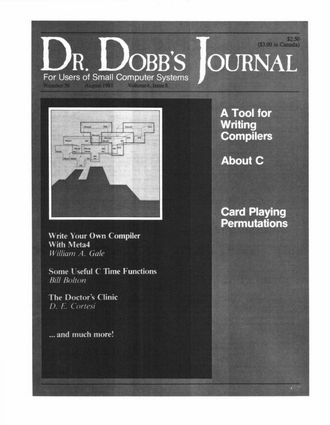
[author : Marlin Ouverson] #Edito
Extract : « Planning each issue of DDJ is like playing a game of editorial bingo. We sit down at a long table with our game card and pieces of corn to lay on the squares. Across the top of the card are the column labels - 8080, 6502,1802, 6800, etc. The horizontal rows are categorized into algorithm, languages, hardware, programming problems, and more. Now and then our pieces form a straight line and we all yell, "Bingo!" [...] »
TABLE OF CONTENTS
[author : William A. Gale] #Listing #Languages #HowItWorks #Method #Programming #Book
Extract : « [...] The reason that a 1964 compiler writing tool is interesting today is that today’s microcomputers are comparable in size and speed to many of the larger 1964 computers. There has been progress in compiler writing tools, of course, so that better tools now exist. But the Meta’s are both simple enough for a hobbyist to understand and powerful enough to be useful. An important point for me was that Meta4 was simple enough to use Pidgin to implement (see DDJ #57). If you want to pursue recent work, a good place to start is a four-article review contained in the August 1980 issue of the IEEE’s Computer. It thus becomes part of a full boot strap operating system. [...]
An overview of how Meta4 works and what you will need to do in order to implement it will also serve to name the several languages and programs involved. A compiler involves three languages: the source language (what it translates from), the target language (what it translates to), and the coding language (what it itself is written in). [...] »
[author : Bill Bolton] #Listing #C #Time
Extract : « Rather than show why you should use a programming language (in this case C), this article endeavours to show why I have used it. An example program demonstrates some aspects of the language and is directly useful to owners of the Mountain Hardware 100,000 day clock board, as well as being generally useful to others with real time clock facilities in their systems. A basic knowledge of C will be required to understand the example program; it is structured and commented, and brief extra descriptions of the functions are given. [...] »
#Experience #Listing #Pascal
Extract : « We’re Going to Answer Our Mail...
The Clinic continues to receive a gratifying flow of mail. Many of the letters reflect hours of work and thought. That isn’t a requirement, by the way; we don’t have space to do justice to all the beautiful analyses we’re getting, while a good problem or discovery dashed off in ten minutes is very useful. [...] »
[author : Dave Cortesi] #Event #Book #Software
Extract : « Two Useful Workshops [...]
MUMPS for 8080 and Apple [...]
Small David Selects Stones, Eyes Giant [...]
HP and the 68000 [...]
Some Information Sources [...]
Books on the 68xx Machines [...]
...and Hardware for Them [...]
Software for OASIS [...]
...And for Five Other Systems [...] »